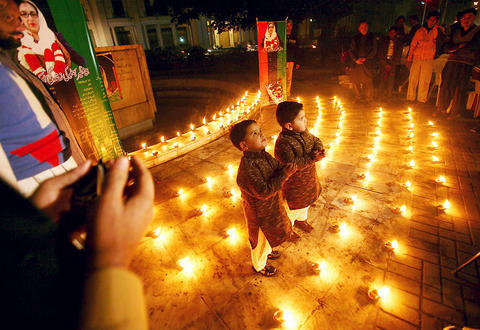Pakistan's general election will be postponed by six weeks until the middle of next month because of the violence sparked by the assassination of opposition leader Benazir Bhutto, election officials said yesterday.
Meanwhile, the foreign office said yesterday the government was open to international help in its investigation into Bhutto's killing, although it rejected calls for a UN-led probe.
"In all the four provinces, for some days this election process came to a complete halt," Chief Election Commissioner Qazi Mohammad Farooq told a news conference. "Polling will now be held on Feb. 18 instead of Jan. 8."

PHOTO: EPA
The killing of the charismatic opposition leader has fueled doubts about stability and the transition to democratic rule in nuclear-armed Pakistan, a crucial US ally in its anti-terrorism efforts.
Farooq said election offices in 11 districts of Sindh, Bhutto's home province, were burned down in the disturbances, destroying transparent ballot boxes, voter screens, voter lists and other election materials.
Supporters of Bhutto's Pakistan People's Party (PPP) and the other main opposition party, led by former prime minister Nawaz Sharif, had wanted the election to go ahead as planned, fearing a delay would work to President Pervez Musharraf's advantage.
"Whatever reasons they give are such lame-duck excuses, because the electoral papers and lists were burnt in the districts but they have those lists in the central office," said Farzana Raja, a spokeswoman for the PPP.
"We reject their baseless excuses. We're ready to fight the election," Raja said.
Bhutto's party would expect to reap a considerable sympathy vote following her assassination in a gun and bomb attack as she left a rally in Rawalpindi last Thursday.
The foreign office yesterday responded to offers of help from abroad.
"The government is committed to a thorough and transparent investigation and is open to receiving assistance from outside," foreign office spokesman Mohammed Sadiq told reporters.
He said that visiting French Foreign Minister Bernard Kouchner had offered help with the probe yesterday, while the US and Britain had already told Pakistan that they were willing to assist.
"France is an important country of the European community. He did offer French help in the investigations. We assured we will contact them if such assistance is needed," Sadiq said.
But he rejected calls from Bhutto's widower, Asif Ali Zardari, for a UN inquiry into her death along the lines of the world body's probe of the killing of former Lebanese prime minister Rafiq Hariri.
"The situation in Pakistan is totally different to the circumstances around Hariri's death," Sadiq said.
Musharraf faces calls from the PPP and politicians in the US for an international probe.
The interior ministry had previously said that Pakistan did not require foreign help, adding that the international community "does not understand the environment" in the country.
Also See: Consumers pay dire price after Bhutto assassination

MORE VISITORS: The Tourism Administration said that it is seeing positive prospects in its efforts to expand the tourism market in North America and Europe Taiwan has been ranked as the cheapest place in the world to travel to this year, based on a list recommended by NerdWallet. The San Francisco-based personal finance company said that Taiwan topped the list of 16 nations it chose for budget travelers because US tourists do not need visas and travelers can easily have a good meal for less than US$10. A bus ride in Taipei costs just under US$0.50, while subway rides start at US$0.60, the firm said, adding that public transportation in Taiwan is easy to navigate. The firm also called Taiwan a “food lover’s paradise,” citing inexpensive breakfast stalls

TRADE: A mandatory declaration of origin for manufactured goods bound for the US is to take effect on May 7 to block China from exploiting Taiwan’s trade channels All products manufactured in Taiwan and exported to the US must include a signed declaration of origin starting on May 7, the Bureau of Foreign Trade announced yesterday. US President Donald Trump on April 2 imposed a 32 percent tariff on imports from Taiwan, but one week later announced a 90-day pause on its implementation. However, a universal 10 percent tariff was immediately applied to most imports from around the world. On April 12, the Trump administration further exempted computers, smartphones and semiconductors from the new tariffs. In response, President William Lai’s (賴清德) administration has introduced a series of countermeasures to support affected

CROSS-STRAIT: The vast majority of Taiwanese support maintaining the ‘status quo,’ while concern is rising about Beijing’s influence operations More than eight out of 10 Taiwanese reject Beijing’s “one country, two systems” framework for cross-strait relations, according to a survey released by the Mainland Affairs Council (MAC) on Thursday. The MAC’s latest quarterly survey found that 84.4 percent of respondents opposed Beijing’s “one country, two systems” formula for handling cross-strait relations — a figure consistent with past polling. Over the past three years, opposition to the framework has remained high, ranging from a low of 83.6 percent in April 2023 to a peak of 89.6 percent in April last year. In the most recent poll, 82.5 percent also rejected China’s

PLUGGING HOLES: The amendments would bring the legislation in line with systems found in other countries such as Japan and the US, Legislator Chen Kuan-ting said Democratic Progressive Party (DPP) Legislator Chen Kuan-ting (陳冠廷) has proposed amending national security legislation amid a spate of espionage cases. Potential gaps in security vetting procedures for personnel with access to sensitive information prompted him to propose the amendments, which would introduce changes to Article 14 of the Classified National Security Information Protection Act (國家機密保護法), Chen said yesterday. The proposal, which aims to enhance interagency vetting procedures and reduce the risk of classified information leaks, would establish a comprehensive security clearance system in Taiwan, he said. The amendment would require character and loyalty checks for civil servants and intelligence personnel prior to